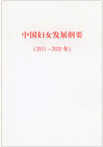- Women and the Environment
(1) Further implement the basic State policy of equality between men and women, and build a gender-equal and harmonious environment within the family and in the society.
(2) Ensure that the principle of gender equality is embodied in policies on the environment and development, culture and media, and social administration and family.
(3) Improve the gender-equality supervision and administration mechanism in the media field.
(4) Unfold community-based education and consultation activities themed on marriage and family to establish equal, civilized, harmonious and stable family relations.
(5) Encourage and guide women to be promoters of harmonious families.
(6) Provide home-based care services for children and the elderly to create conditions to make it easier for women to balance their career and family duties.
(7) Comprehensively solve the problem of safe drinking water in rural areas, and reduce harm to women's health from polluted water. Increase to about 85 percent the proportion of rural people benefiting from centralized water supply.
(8) Increase the percentage of sanitary toilets to 85 percent in rural areas, and ensure a rational man-woman ratio of public toilet stalls in urban areas.
(1) Encourage women to be active in energy-saving and emission-reduction drives and to lead a low-carbon life.
(2) Enhance women's capabilities to prevent and deal with disaster risks, and meet their special needs in disaster reduction.
Strategies and Measures:
(1) Step up theoretical research and advocacy on the basic State policy of equality between men and women. Integrate gender equality policy research with the research on socialism with Chinese characteristics to enrich the policy's theoretical foundation. Encourage education on the gender-equality policy in Party schools and administration colleges' teaching plans and in training plans for officials at all levels. Publicize the gender-equality policy through various channels and in various forms in communities and families and promote the policy's social influence.(2) Formulate and implement gender-sensitive cultural and media policies. Make analyses and evaluations of cultural and media policies from a gender perspective to reflect the policies' different influences on men and women. Formulate cultural and media policies that promote harmonious development of men and women and prohibit gender discrimination.
(3) Make more efforts to publicize women's active role in promoting economic and social development. Use all media, including the press, radio, television and film, and also literature and the arts, to demonstrate women's achievements, value and contributions through their participation in and promotion of economic and social development, laying emphasis on women role models, in efforts to inspire among women the spirit of self-esteem, self-confidence, self-reliance and self-strengthening.
(4) Step up positive media guidance and management. Integrate gender awareness into media training programs to ensure that media employees, decision-makers and managers are more gender-sensitive. Improve the media supervision and management mechanism, add gender-awareness supervision contents, and invite gender experts to monitor media activities. Call on the press and advertisers to exert strict self-discipline. Prohibit gender discrimination manifested in media depreciation and denial of women's personal dignity.
(5) Enhance women's ability to acquire knowledge and information through the media. Create conditions and opportunities for women to gain access to the mass media and to learn to use them. Promote media and communication technologies among needy and disabled women, migrant women workers and those in remote rural areas. Encourage civil society and enterprises to help women in remote areas obtain information and services through information and communication technologies.
(6) Create an equal and harmonious family environment. Advocate, through various publicity and education activities, family virtues, including respect for the elderly and care for the young, equality between men and women, harmony between husband and wife, thrifty household management, and good neighborhood relationships. Establish an advanced gender culture and advocate civilized, healthy and scientific lifestyles and equal sharing family responsibilities between men and women.
(7) Invite women to participate in practical family education guidance and publicity activities. Disseminate family education knowledge through various channels and in various forms, and encourage parents to accept family education guidance services and related activities. Encourage women to participate in family education research and promote education results.
(8) Further carry out family education guidance service and publicity activities. Bring into full play the role of traditional and modern media in popularizing family education knowledge to help parents foster scientific education concepts and grasp scientific methods.
(9) Promote the community public service system. Provide family-oriented public services to help husbands and wives better fulfill work and family duties. Develop public nursery services for families with infants and community services for children in both urban and rural areas. Raise the socialized level of household work.
(10) Reduce the harm to women from environmental pollution. Improve the databases for monitoring the environment and health, analyze and evaluate from a gender perspective pollution from drinking water, indoor air, also industrial residues and living environment. Intensify control and management of environmental pollution to reduce its hazards to the environment. Intensify the levels of domestic garbage reduction, utilization and decontamination. Further develop and use clean energy, and improve the energy structure in households. Strengthen protection of women engaged in toxic and potentially harmful work.
(11) Mobilize women to take an active part in ecological development and environmental protection. Carry out, in various forms, multi-level ecological and environmental protection publicity activities to raise women's awareness of ecological civilization and increase their participation in ecological development and environmental protection. Encourage women to participate in the energy-saving and emission-reduction efforts, and to promote green consumption by practicing a low-carbon lifestyle.
(12) Establish and improve a drinking water security system in rural areas. Continue to push forward the construction of water safety projects and centralized water supply projects in rural areas. Strengthen the operation and management of water safety projects in rural areas through designated managerial bodies, intensify water source protection and water quality monitoring, and ensure the projects' long-term effects.
(13) Expand the popularization of sanitary toilets in rural areas. Publicize among rural residents the importance of such practice. encourage local farmers to build their own sanitary. toilets and provide them with more technical guidance and services. Introduce toilet reform into the program for building a new countryside and include reform results into annual appraisals of government work.
(14) Ensure a rational man-woman ratio of public toilet stalls in urban areas. Carry out research from a gender perspective on men-women demands and utilization rate of public toilets when making plans of stadiums and shopping malls, and take into account women's physiological features when determining public toilet stalls.
(15) Reflect gender awareness in disaster-reduction work. Provide necessary assistance and services to women based on their special needs. Improve women's competence in preventing and dealing with disasters through publicity and training, and include women's participation in related work. Strengthen guidance to women in disaster-hit areas on self-help by engaging them in production and employment.
(16) Promote international exchange and cooperation for advancing women's development. Actively implement the UN Convention on the Elimination of All Forms of Discrimination Against Women and other international instruments. Expand multilateral and bilateral exchanges and cooperation. Publicize China's achievements in advancing women's development, and promote Chinese women's influence in international affairs.





 WeChat
WeChat Weibo
Weibo 京公网安备 11010102004314号
京公网安备 11010102004314号